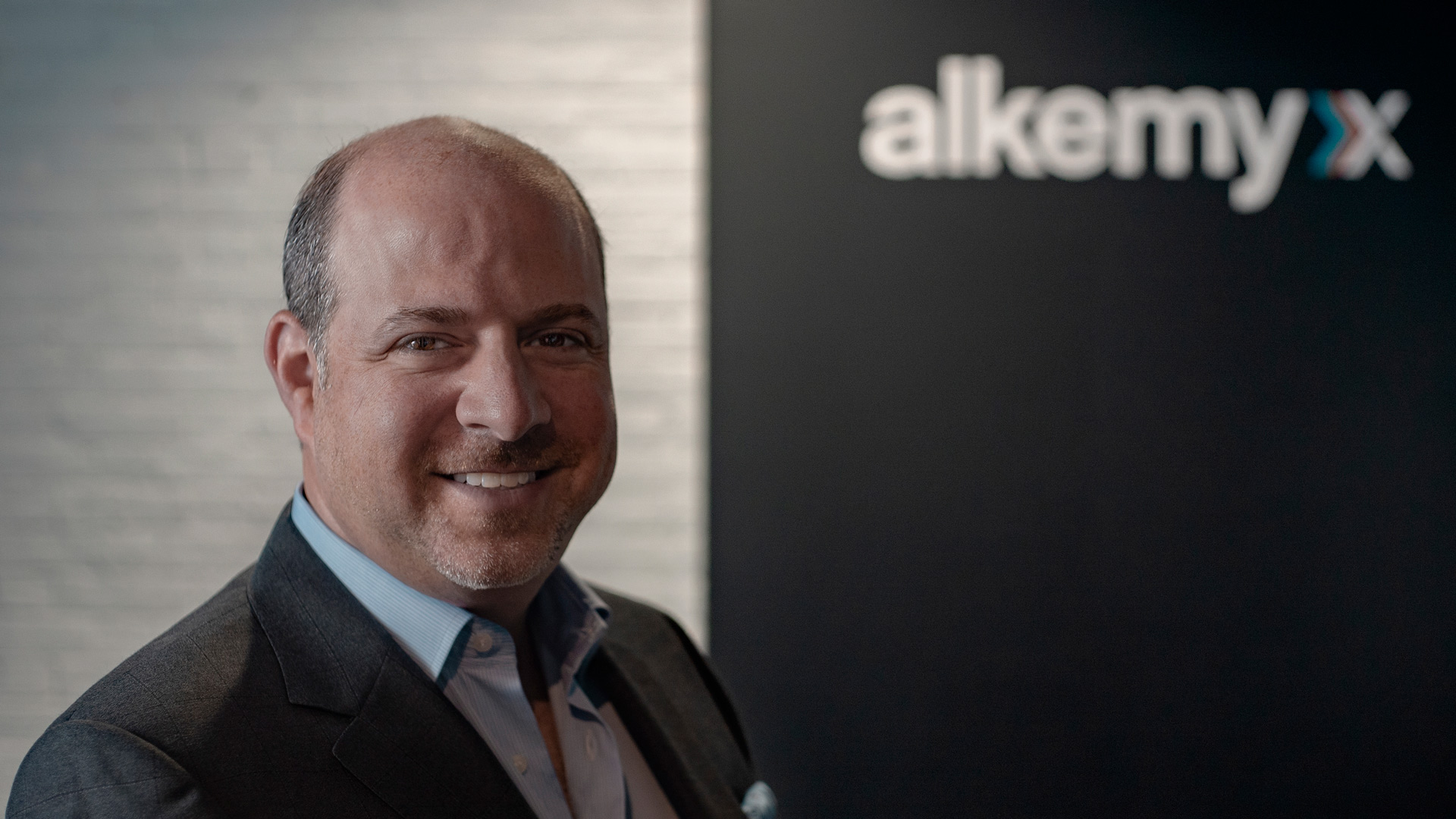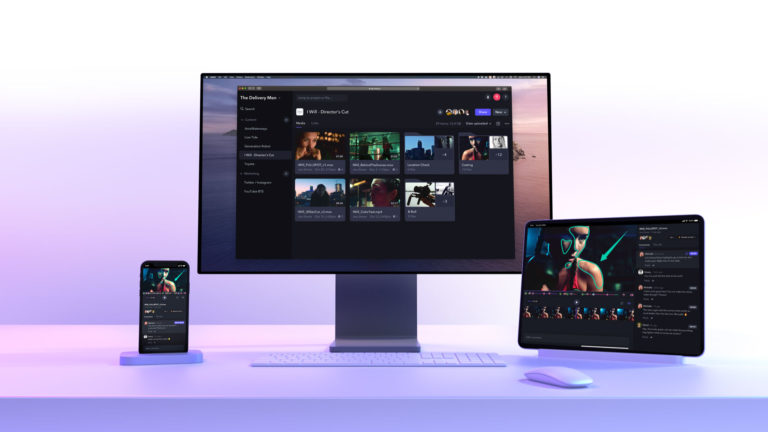When Justin Wineburgh took over as president and CEO of Philadelphia-based creative studio Alkemy X three years ago, the company was in trouble. The commoditization of post-production equipment was taking its toll, consolidating the market for post-production services. While Alkemy X had enjoyed a sustained period of organic growth and expansion that got it involved with everything from unscripted television production to feature-film VFX work, it found itself spread thin, having difficulty balancing its various offerings in an increasingly turbulent market.
The outlook was so dire that Wineburgh, who had been an outside lawyer for the company, came up empty when he tried to help recruit a new president and CEO to take over the business. “There were not a lot of people willing to take a job turning around a struggling media company in Philadelphia,” Wineburgh observes, matter-of-factly.
That’s when the chairman of the board asked Wineburgh if he would be willing to take over the company.
“It was November of 2015, and the company was in pretty bad shape at that time,” Wineburgh recalls. “Meanwhile, I had a great legal career. I had built a large media-and-entertainment law practice at one of the largest firms in the world [Philadelphia-based Cozen O’Connor], where I became partner at 31. I was at this law firm for 16 years and was always a student — not just of the law, but of business. And the M&E business is a bit of a fickle one.
“I just said no.”
It seemed like a clean break, but something about Wineburgh’s “no” just didn’t stick. He started turning the opportunity over in his head, trying to imagine how it could affect his own life’s trajectory. Wineburgh was 42 and his legal career was well established — he headed his firm’s media and entertainment practice, a sure thing. But switching to something inherently risky, like running a media company? That could be a bad move. Then again, it seemed like a new challenge might offer its own rewards.
“I knew what my life would look like if I stayed at this law firm,” Wineburgh says. “I’d be tied by golden handcuffs to a golden treadmill. That’s nice and fine and safe, but I was young and relatively obligation free. I wasn’t married. I did not have children to worry about. It’s infrequently in life that we have the opportunity to test ourselves, and our resolve, without some safety net, and this presented that opportunity — the opportunity to make a change in my life, move out of my comfort zone, and make an impact.”
Wineburgh was a lawyer who didn’t know if he was a businessman. But he knew how to study a problem and find solutions. He knew at least something about reading financial statements and records. And he knew how to ask for help understanding anything that didn’t make intuitive sense. Finally, he says, he saw the way forward.
“As a lawyer, you gain some great skills of learning, listening, problem-solving, and identification of issues. These are no different than CEO skills. And I knew that, if I gave it a shot, I wouldn’t fail for lack of trying,” he says. “The worst that would happen was that I’d go back to practicing law.”
And so Wineburgh resigned his partnership at Cozen O’Connor. He spent most of January 2016 wrapping up his obligations to clients and colleagues before leaving the firm on Friday, January 29. He started at Alkemy X on Monday, February 1.

The reception area at Alkemy X in Philadelphia. The firm also has offices in New York, Los Angeles and Amsterdam.
Photography by Nick Pitcavage
A Brief History of Alkemy X
He had a lot to sort out at his new gig. The prior history of Alkemy X looked like this: the company (known until 2014 as Shooters Post and Transfer) was founded in 1981 by David West, Craig Needelman and Jay Hartigan, who had met each other while working together in local Philadelphia television. Throughout the 1980s, they built up their company on the bedrock of basic post-production services for the local market, investing equally in equipment and personnel. In the late 1980s and early 1990s, they extended the company’s reach with additional editorial, color and audio recording and mixing facilities. The operation grew to almost 50,000 square feet by the late 1990s, when it became the first in Philly to boast a Spirit Datacine film scanner and DaVinci color-correction system.
At that point, according to Wineburgh, the business entered a long period of rapid transformation as technology improved and barriers to entry began to fall in the editorial business. The company responded by expanding into more creative services, taking on live-action commercial production work by the 2000s as a supplement to the legacy post business. That led to a lucrative production deal on a hit series for Food Network, Dinner: Impossible, and then Restaurant: Impossible, pointing the way to another profitable business venture in unscripted television. By the time recession hit in 2008 and 2009, Alkemy X was well afloat and even expanded its purview again, launching a feature-film VFX business under the brand Dive VFX. And then, when the New York post-production tax-credit program finally came online in 2011, Alkemy X relocated the lion’s share of its business to Manhattan to take full advantage. It even started a promo division, Bigsmack.
And that’s about the time things went south. “All of these growth divisions were really reliant on the company’s legacy post business,” Wineburgh says. “The problem was that post-production work was contracting. Why? Because the equipment was getting cheaper, and the schools were getting better. There was a lot of competition out in the world. So by 2013, this company hit a massive speed bump. And then it really started into a downward spiral.”
As the company started to slip behind the cutting edge of technology and creativity, it became harder to sustain profitability. As profits dwindled, it became more difficult to pay the salaries that kept the company on the cutting edge in the first place. In 2014 the company’s name change, uniting all the brands under the banner of Alkemy X, seemed to acknowledge the need for a new beginning — but the reset was still to come.
“In 2015, the company had a monumental meltdown and lost a ton of money,” Wineburgh says flatly. “That was an inflection point that brought me to the business.”
No Time to Lose
Asked if he considered taking some time off from work before plunging into his new role, Wineburgh is adamant: there was no time. “We had insufficient sales, and expenses were out of control,” he says. “Immediate problems included real-estate issues and morale issues. We had HR problems, insurance problems and leadership problems. As far as our staff, we needed to figure out who we wanted to retain and who we did not see fitting into our vision of the future. And I had to figure out what that vision was.”
So Wineburgh, the new CEO of Alkemy X, watched. He watched his staff interacting with each other. He watched his salespeople courting customers and making sales. He thought hard about the challenges of maintaining profitability while exceeding client expectations. And he drew on his experience as a lawyer to think about how to keep customer relationships in the foreground. “Lawyers can often be viewed as the worst, lowest common denominator,” he says. “The worst. Just a terrible cost center. So I built my legal practice on the premise of how can my clients embrace working with their lawyer? It’s sort of the same thing here. We had to make our clients see that hiring Alkemy X is going to get them a return on their investment. They can’t afford not to work with us.”
That’s one way Wineburgh approached the issue of in-house talent and making hard decisions about trimming the payroll. He worked his way through the company’s roster, identifying talent that was being specifically requested by clients — and, in addition, figuring out who was critical to offering value, even if they weren’t being personally requested. In short, he was wary of making deep cuts that would lose people who were crucial to the company’s reputation for high-quality work. And he valued experience — he notes that two of the eight staff on the company’s current leadership team were already employed there when he came on board.
“We want our clients to be blown away, not just by the end product but by the process,” he says. “That’s why I focus on our back-of-the-house, non-artist staff: our assistants, our receptionists, our client-services coordinator. In so many companies, the top-down leadership says, ‘Focus on the customer or client first.’ I focus on our employees first. We’ve got all these folks out there on the front line. Our receptionist is going to interact with the client before the client gets to me. If those front-line employees feel that they have worth and purpose, they are going to encounter problems and solve them before they become problems.”
On the other hand, Wineburgh has increased the scrutiny applied to the company’s clients. “One of the problems this company had was that it was ignoring the concept of qualified clients,” he says. “Any client that came through the door, they would say, ‘If you have a creative problem, we can solve it.’ But I don’t think this company always did a great job of solving those problems. Certain types of commercial work — like corporate video work — may not always work for us. And we are extremely selective with our VFX work for feature films. That’s a risky proposition, and we are not ever the sole vendor on a feature film. We’ve changed our promo division — that can be highly profitable, but you need to have volume. If you don’t have volume, or someone to develop business to volume, you’re going to struggle. And I am not going to repeat the history of this company and go off drilling for oil. I need this company, as we get it healthy, to be fishing with dynamite. So we pick our business carefully, and we exceed our clients’ expectations.”
Turnaround Story
Happily, Wineburgh says, Alkemy X now finds itself well on the road to recovery. Since he took over, the company has developed the reality special Drag Me Down the Aisle for TLC and lifestyle series The 212 for Fuse, along with commercials and branded media for Google, Samsung, Comcast, Bud Light and others. On the VFX front, its clients include The Marvelous Mrs. Maisel, Fear the Walking Dead and Mr. Robot. It won six 2019 Addy Awards from the Philly Ad Club, including Best of Show for “The Plastic Ocean,” created for marine wildlife advocacy operation Sea Shepherd through agency FF New York.
“Plastic Ocean” was created for Sea Shepherd via FF New York.
YouTube
The company’s footprint has increased in New York and Amsterdam as VFX and post operations have expanded along with its client roster, and a Los Angeles facility opened in 2018. Recent hires include former HDTV executive Andy Singer, former truTV/Court TV executive Glen Freyer, executive creative director Nicholas Weigel, veteran compositing supervisor Rebecca Manning, and commercial directors Jonathan Yi and Rob Boocheck.
Even more importantly, Wineburgh says the bottom line has improved. “I think the company’s in an exceptional place now,” Wineburgh says. “The company was sustaining multimillion-dollar losses up through December 31, 2015, before I got here. This company, at the end of 2018, has positive EBITDA [earnings before income tax, depreciation and amortization] and positive net profits. It has been one of the most exceptional turnaround stories in the media and entertainment business — I know because I studied all of them to see what I could learn from them.”
In fact, Wineburgh’s confident enough in the company’s future to buy into it completely — in April of 2018, Wineburgh became the company’s sole shareholder. (“The roller-coaster ride of the last six years upset their stomachs a bit,” he ventures with a chuckle.) And, earlier this year, he was named a finalist in the Ernst & Young Entrepreneur Awards for Greater Philadelphia, recognizing his work in the company’s turnaround. (Winners will be announced at a June 19 gala.)
“I believe in the company, I believe in where it is now, I believe in our future growth — and I believe in it to the point where I’ve gone all-in on the business,” he says.
Next Steps
The next challenge, of course, will involve watching over the company as it continues to adapt to an ever-changing media market. Wineburgh says he’s already detecting shifting trends in terms of what Alkemy X’s clients are after and making sure he has the right people on board to take its work to the next level. One trend is that customers are increasingly looking for top-drawer creative thinking and design skills ahead of traditional post-production chops. That applies in some regards to VFX, where Alkemy X might be able to suggest creating certain elements in CG to save money on a live-action shoot, but it really comes to the fore in commercial work.
“We’re seeing more requests for personalized content and advertising,” Wineburgh said, nodding to the burgeoning market for over-the-top streaming services. “The billions of dollars being spent on on-demand subscription services has totally changed the advertising business. As a result, clients are looking for personalized content that embeds the advertising toward the cord-cutting set. We’re seeing a lot of growth in our social media work and the demand for content for social media platforms. And then there’s our original content division. Platforms such as Netflix and Amazon are spending billions on content, and the content they’re looking for is branded content. It’s got to be integrated.
“The traditional methods of advertising just aren’t working any more,” he declares, with more excitement than trepidation. “People don’t want to be sold to or pandered to. They want to be entertained. How does a brand integrate their advertising message into organic content? You need this hybrid between a developer of content and an advertising executive. And we have those people on staff now.”
Another example he cites is an increasing demand for AR and VR work, which requires a serious investment in technology and infrastructure. Wineburgh makes no pretense to being a technologist, which means he must hire staff that he is confident can take the company to the next level as its original generation of engineers approaches retirement age. “It’s incumbent on us to hire slowly, to make sure we have a fit skill-wise as well as a cultural fit,” he says. “We want people to be happy here. And, when we have a sustained reputation for excellence, it makes that recruiting function a little bit easier. It’s taken us three years to get there, but we’ve made a little progress each year. Now, we’re hitting our stride.”
Alkemy X: www.alkemy-x.com
Did you enjoy this article? Sign up to receive the StudioDaily Fix eletter containing the latest stories, including news, videos, interviews, reviews and more.










